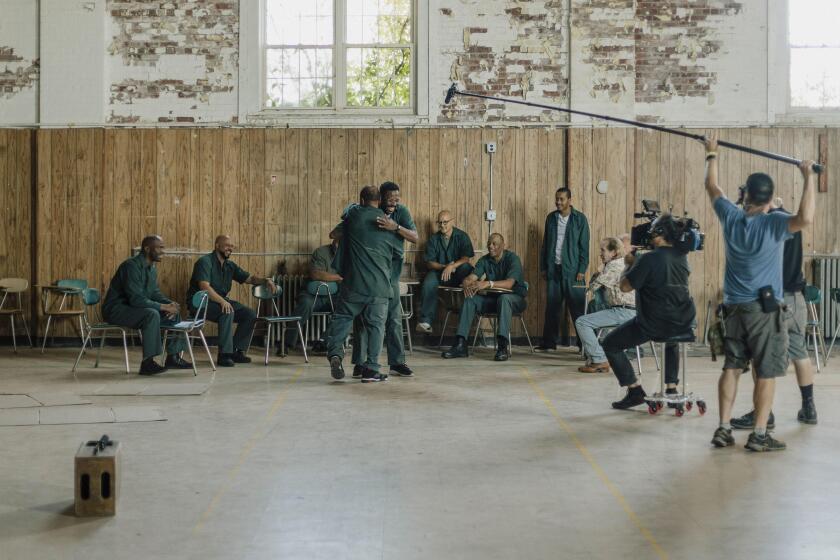Down a ‘Rabbit Hole’ for reflections on grief
For a young woman who recently decked a stranger in a bar brawl, lost her job at Applebee’s and got knocked up by a guy who’s still living with his old girlfriend, Izzy sure has a lot of advice to give.
Trying to help her investment-banker brother-in-law sell his house, she urges him to change the robot sheets in the small bedroom. “If you had a kid, would you wanna move into a house where a boy just died?” she asks.
Straightforward, unsentimental and spoken in love, the question captures the qualities that make David Lindsay-Abaire’s “Rabbit Hole” one of the more refreshing dramas to come around in a while.
If the story of a husband and wife struggling to reassemble their marriage after the accidental death of their 4-year-old son seems like too much to bear, rest assured that the work is infused with more humorous life than the majority of carefree comedies clamoring on our stages and screens these days.
Heartbreaking as it can be, the play is never grim. It’s too truthful, too spirited, too wise to be depressing. A study of the subterranean passageways of grief, it serves to remind that loss, even of the most shattering kind, can move us incrementally toward a deeper appreciation of what remains.
The Geffen Playhouse production, which opened Wednesday under the direction of Carolyn Cantor, marks the West Coast premiere of “Rabbit Hole.” The play ran last season on Broadway in an exquisitely acted production headed by Cynthia Nixon, who won a Tony for her portrait of a mother not quite ready to pick up the pieces.
A more conventional work than the playwright’s previously quirky farces (“Fuddy Meers,” “Wonder of the World,” “Kimberly Akimbo”), “Rabbit Hole” invites actors to settle into characters who often seem like real people rather than stage roles.
The quiet three-dimensional depth of Lindsay-Abaire’s writing can’t be accessed via phony theatrics. There’s either a genuine communion between player and part or there’s nothing.
Fortunately, there’s not a false note sounded by Cantor’s ensemble. Her production may not have the same crackling intensity, but the portraits put forth by her cast are remarkably nuanced, like figures in a short story luring readers to make their own psychological discoveries.
As Becca, the woman who gave up her career at Sotheby’s to become a mother only to suffer the most crushing blow, Amy Ryan lets us see the physical tension behind her character’s self-control. A stylish suburban New York homemaker, she holds fast to a domestic routine that has a way of keeping others at bay.
Even the fancy desserts she whips up for everyone’s pleasure have an edge to them. She doesn’t believe that anyone could possibly understand what she’s going through and doesn’t want them to fumblingly try.
Much of the comic relief in the play comes from Becca’s encounters with her less than picture-perfect mother and sister, who keep dropping by to give her company. Both sense her unspoken disapproval of them, but both love her too much to let that get in the way of being there.
Hanging around with a wine glass always in need of a refill, Joyce Van Patten’s hilariously blowsy Nat understands what her daughter’s going through only too well, having lost a child herself. Becca may not accept that her heroin-addict brother’s suicide is in any way equivalent, but she eventually turns to her mother for reassurance that there’s a light at the end of her tunnel of mourning.
Missy Yager’s Izzy has an infectious, garish charm. Good-natured enough to make herself the butt of her own anecdotes, she sees more than she lets on, though she’s smart enough to know when real candor is called for. Ryan and Yager have a genuine sibling chemistry that parts a curtain between adults and their childhoods.
In a cast of splendid performances, Tate Donovan stands out for his unforced naturalism. His depiction of Howie, a father trying to move beyond what he can neither control nor forget, is rendered with such command and conviction that it’s like the private record of a man groping toward some semblance of normality again.
As Jason, the high school boy driving the car that tragically killed the boy, Trever O’Brien conveys just the right note of gawky sorrow to provoke the beginning of compassionate healing in Becca’s heart.
“Rabbit Hole” has been criticized for being less theatrically ambitious than Lindsay-Abaire’s previous efforts. But if creating drama this beautifully observed is a step backward, then it’s one that more playwrights should consider taking in their zigzag to maturity.
*
‘Rabbit Hole’
Where: Geffen Playhouse, 10886 Le Conte Ave., Westwood
When: 7:30 p.m. Tuesdays through Thursdays, 8 p.m. Fridays, 4 and 8:30 p.m. Saturdays, 2 and 7 p.m. Sundays
Ends: Oct. 22
Price: $35 to $69
Contact: (310) 208-5454, (213) 365-3500
Running Time: 2 hours
Amy Ryan...Becca
Missy Yager...Izzy
Tate Donovan...Howie
Joyce Van Patten...Nat
Trever O’Brien...Jason
By David Lindsay-Abaire. Directed by Carolyn Cantor. Sets by Alexander Dodge. Costumes by Robert Blackman. Lights by Matthew Richards. Sound by Karl Lundeberg. Production stage manager Michelle Magaldi.
More to Read
The biggest entertainment stories
Get our big stories about Hollywood, film, television, music, arts, culture and more right in your inbox as soon as they publish.
You may occasionally receive promotional content from the Los Angeles Times.







